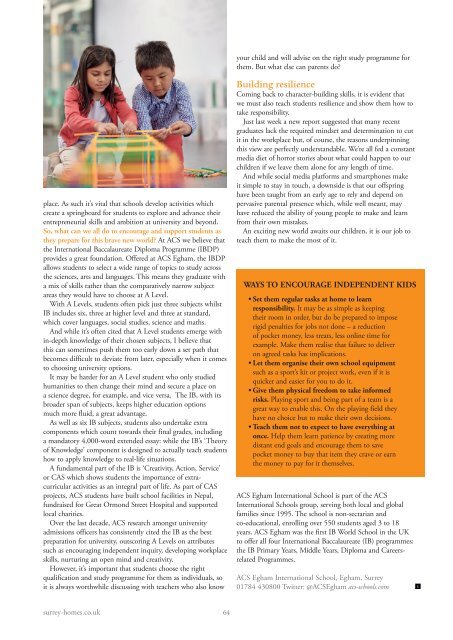Education | ED06 | Summer 2019
A Wealden Times & Surrey Homes Magazine
A Wealden Times & Surrey Homes Magazine
Create successful ePaper yourself
Turn your PDF publications into a flip-book with our unique Google optimized e-Paper software.
your child and will advise on the right study programme for<br />
them. But what else can parents do?<br />
place. As such it’s vital that schools develop activities which<br />
create a springboard for students to explore and advance their<br />
entrepreneurial skills and ambition at university and beyond.<br />
So, what can we all do to encourage and support students as<br />
they prepare for this brave new world? At ACS we believe that<br />
the International Baccalaureate Diploma Programme (IBDP)<br />
provides a great foundation. Offered at ACS Egham, the IBDP<br />
allows students to select a wide range of topics to study across<br />
the sciences, arts and languages. This means they graduate with<br />
a mix of skills rather than the comparatively narrow subject<br />
areas they would have to choose at A Level.<br />
With A Levels, students often pick just three subjects whilst<br />
IB includes six, three at higher level and three at standard,<br />
which cover languages, social studies, science and maths.<br />
And while it’s often cited that A Level students emerge with<br />
in-depth knowledge of their chosen subjects, I believe that<br />
this can sometimes push them too early down a set path that<br />
becomes difficult to deviate from later, especially when it comes<br />
to choosing university options.<br />
It may be harder for an A Level student who only studied<br />
humanities to then change their mind and secure a place on<br />
a science degree, for example, and vice versa. The IB, with its<br />
broader span of subjects, keeps higher education options<br />
much more fluid, a great advantage.<br />
As well as six IB subjects, students also undertake extra<br />
components which count towards their final grades, including<br />
a mandatory 4,000-word extended essay: while the IB’s ‘Theory<br />
of Knowledge’ component is designed to actually teach students<br />
how to apply knowledge to real-life situations.<br />
A fundamental part of the IB is ‘Creativity, Action, Service’<br />
or CAS which shows students the importance of extracurricular<br />
activities as an integral part of life. As part of CAS<br />
projects, ACS students have built school facilities in Nepal,<br />
fundraised for Great Ormond Street Hospital and supported<br />
local charities.<br />
Over the last decade, ACS research amongst university<br />
admissions officers has consistently cited the IB as the best<br />
preparation for university, outscoring A Levels on attributes<br />
such as encouraging independent inquiry, developing workplace<br />
skills, nurturing an open mind and creativity.<br />
However, it’s important that students choose the right<br />
qualification and study programme for them as individuals, so<br />
it is always worthwhile discussing with teachers who also know<br />
Building resilience<br />
Coming back to character-building skills, it is evident that<br />
we must also teach students resilience and show them how to<br />
take responsibility.<br />
Just last week a new report suggested that many recent<br />
graduates lack the required mindset and determination to cut<br />
it in the workplace but, of course, the reasons underpinning<br />
this view are perfectly understandable. We’re all fed a constant<br />
media diet of horror stories about what could happen to our<br />
children if we leave them alone for any length of time.<br />
And while social media platforms and smartphones make<br />
it simple to stay in touch, a downside is that our offspring<br />
have been taught from an early age to rely and depend on<br />
pervasive parental presence which, while well meant, may<br />
have reduced the ability of young people to make and learn<br />
from their own mistakes.<br />
An exciting new world awaits our children, it is our job to<br />
teach them to make the most of it.<br />
WAYS TO ENCOURAGE INDEPENDENT KIDS<br />
• Set them regular tasks at home to learn<br />
responsibility. It may be as simple as keeping<br />
their room in order, but do be prepared to impose<br />
rigid penalties for jobs not done – a reduction<br />
of pocket money, less treats, less online time for<br />
example. Make them realise that failure to deliver<br />
on agreed tasks has implications.<br />
• Let them organise their own school equipment<br />
such as a sport’s kit or project work, even if it is<br />
quicker and easier for you to do it.<br />
• Give them physical freedom to take informed<br />
risks. Playing sport and being part of a team is a<br />
great way to enable this. On the playing field they<br />
have no choice but to make their own decisions.<br />
• Teach them not to expect to have everything at<br />
once. Help them learn patience by creating more<br />
distant end goals and encourage them to save<br />
pocket money to buy that item they crave or earn<br />
the money to pay for it themselves.<br />
ACS Egham International School is part of the ACS<br />
International Schools group, serving both local and global<br />
families since 1995. The school is non-sectarian and<br />
co-educational, enrolling over 550 students aged 3 to 18<br />
years. ACS Egham was the first IB World School in the UK<br />
to offer all four International Baccalaureate (IB) programmes:<br />
the IB Primary Years, Middle Years, Diploma and Careersrelated<br />
Programmes.<br />
ACS Egham International School, Egham, Surrey<br />
01784 430800 Twitter: @ACSEgham acs-schools.com<br />
surrey-homes.co.uk<br />
64


















